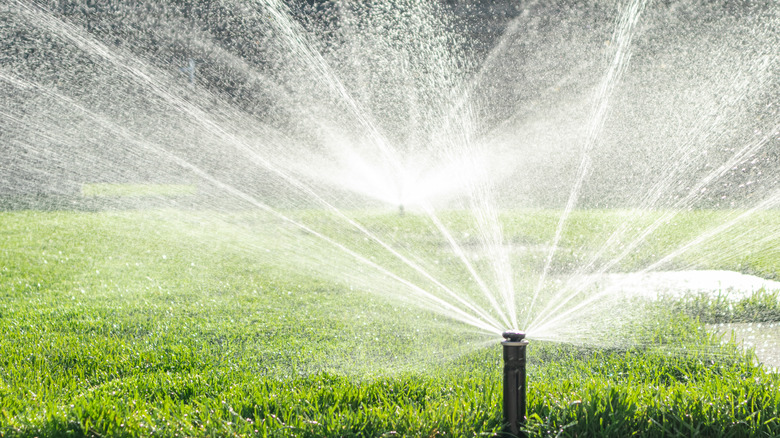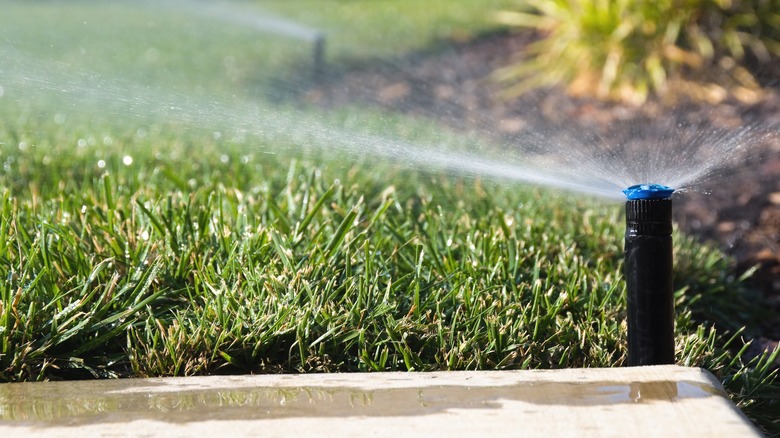TikTok Warns How Sprinklers Could Be Damaging Your Property
A recent TikTok video warning how sprinklers can damage homeowner's property has taken the internet by storm. The issue highlighted in the video regards improper sprinkler placement that can, over time, erode a fence or foundation. While it seems obvious that this could be an issue with wooden fences, interestingly enough, the fence in the video is made from stone. Not only does this speak to the immense power of water to erode surfaces and the potential issues that improper sprinkler placement can cause to your property.
Sprinklers can be an essential part of maintaining a healthy green lawn or landscape plants; however, poorly installed irrigation can pose a dire threat to your property and the environment. Proper irrigation design and placement are key elements when it comes to sustainable landscaping and, of course, protecting your home and property from damage. The solution is simple and lies in correct placement, sustainable irrigation design and practices, and ensuring your landscaping or irrigation company knows what they're doing. Losing a fence, or worse, having a damaged foundation, is not ideal and can easily be avoided. Fortunately, there are many ways to make the most out of your lawn irrigation system and avoid expensive and wasteful mistakes.
Incorrect sprinkler placement and how it affects your property and wallet
Improper sprinkler placement may cost you a lot of money in the long run. When sprinkler systems are not calibrated correctly and placed too close to a fence or foundation, they can compromise the integrity of whatever structure they are nearest to. Do not underestimate the immense power of water to completely erode even a seemingly tough material. Poorly installed sprinklers or irrigation systems can lead to a wanton waste of water, poorly irrigated or overwatered landscape plants or areas of your lawn, burst pipes, indentations in your yard, damage to your home or fences, poor drainage, and high water bill. Placing sprinklers too close to your home, over time, can cause severe damage that, at first, will be unnoticeable and soon become a severe problem.
Aside from poor placement, a leak in the pipes or valve can also be the culprit for damage to your house or property. If you're concerned, it's essential to check for signs of dampness around the foundation of your house. If you find areas that stay wet, pool water, or general moisture around the base of your home, you should check for a leak or contact an accredited irrigation professional. Even if your sprinkler heads are not too close to your house, incorrectly installed underground irrigation piping can also cause leakages and other problems that could compromise the integrity of your foundation.
Why sustainable irrigation practices are good for you and the environment
Poor irrigation installation not only poses a threat to homeowners, but when done incorrectly, it can waste catastrophic levels of water that deplete groundwater reserves and create harmful runoff from pesticides and fertilizers used in lawn maintenance. Not to mention, even though water is a natural resource, it is not at all free! The worst part? When irrigation is installed poorly, your plants don't even benefit from the water because it often runs off into the street or your fence and misses the plants it's meant to water.
In the US alone, Americans use 8 billion gallons of water daily to irrigate lawns (via the EPA). That's a lot of water, especially considering areas of the US that are drought-prone AND all of the poorly installed irrigation that leads to significant water waste. The EPA recommends a few "water-smart" ways to optimize your irrigation, reduce your water footprint, curb pollution, and save money. A recent study also found that smart irrigation technologies that account for weather data, soil moisture, and system malfunctions save homeowners money and water in the long run. Aside from the economic and environmental implications, it is essential to ensure that your sprinkler system, whether smart or automated, is installed and calibrated in a way that your yard and plants are getting watered, not your fence or foundation!

